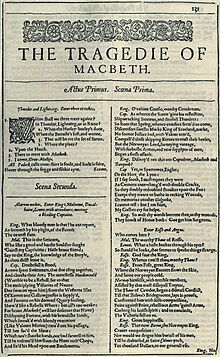
Back Macbeth Afrikaans مكبث (مسرحية) Arabic Macbeth AST Макбет Bulgarian ম্যাকবেথ Bengali/Bangla Macbeth Breton Macbeth BS Macbeth Catalan Macbeth Czech Macbeth (drama) Welsh
 Title page of the part in the First Folio. | |
| Author | William Shakespeare |
|---|---|
| Country | London, England |
| Language | English |
| Genre | Shakespearean tragedy Tragedy |
| Set in | Scotland and England (Act IV, Scene III) |
| Publisher | Edward Blount and William Jaggard |
Publication date | 1623 |
| Text | The Tragedie of Macbeth at Wikisource |

Macbeth (/məkˈbɛθ/, full title The Tragedie of Macbeth) is a tragedy by William Shakespeare. It is thought to have been first performed in 1606.[a] It dramatises the damaging physical and psychological effects of political ambition on those who seek power. Of all the plays that Shakespeare wrote during the reign of James I, Macbeth most clearly reflects his relationship with King James, patron of Shakespeare's acting company.[1] It was first published in the Folio of 1623, possibly from a prompt book, and is Shakespeare's shortest tragedy.[2]
A brave Scottish general named Macbeth receives a prophecy from a trio of witches that one day he will become King of Scotland. Consumed by ambition and spurred to action by his wife, Macbeth murders King Duncan and takes the Scottish throne for himself. He is then wracked with guilt and paranoia. Forced to commit more and more murders to protect himself from enmity and suspicion, he soon becomes a tyrannical ruler. The bloodbath and consequent civil war swiftly take Macbeth and Lady Macbeth into the realms of madness and death.
Shakespeare's source for the story is the account of Macbeth, King of Scotland, Macduff, and Duncan in Holinshed's Chronicles (1587), a history of England, Scotland, and Ireland familiar to Shakespeare and his contemporaries, although the events in the play differ extensively from the history of the real Macbeth. The events of the tragedy are usually associated with the execution of Henry Garnet for complicity in the Gunpowder Plot of 1605.[3]
In the backstage world of theatre, some believe that the play is cursed and will not mention its title aloud, referring to it instead as "The Scottish Play". The play has attracted some of the most renowned actors to the roles of Macbeth and Lady Macbeth and has been adapted to film, television, opera, novels, comics, and other media.
Cite error: There are <ref group=lower-alpha> tags or {{efn}} templates on this page, but the references will not show without a {{reflist|group=lower-alpha}} template or {{notelist}} template (see the help page).
- ^ Wickham 1969, p. 231.
- ^ Clark & Mason 2015, p. 1.
- ^ Bloom 2008, p. 41.
© MMXXIII Rich X Search. We shall prevail. All rights reserved. Rich X Search